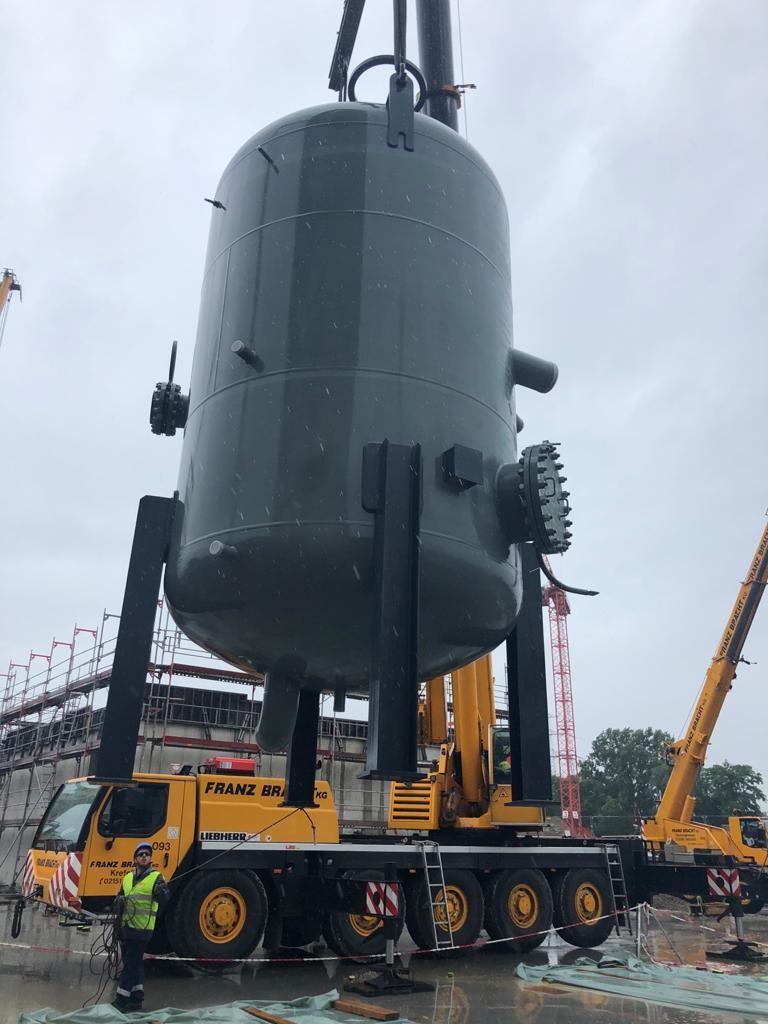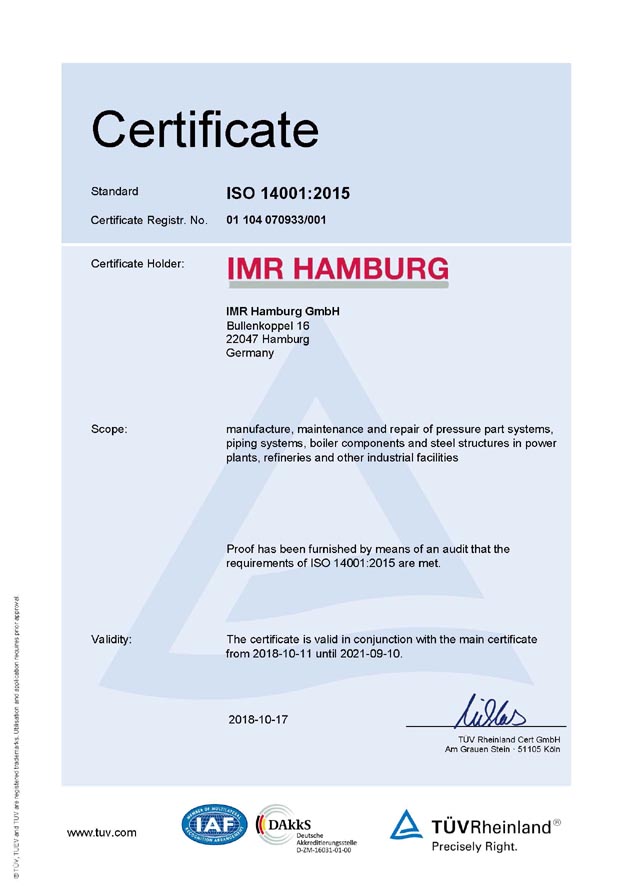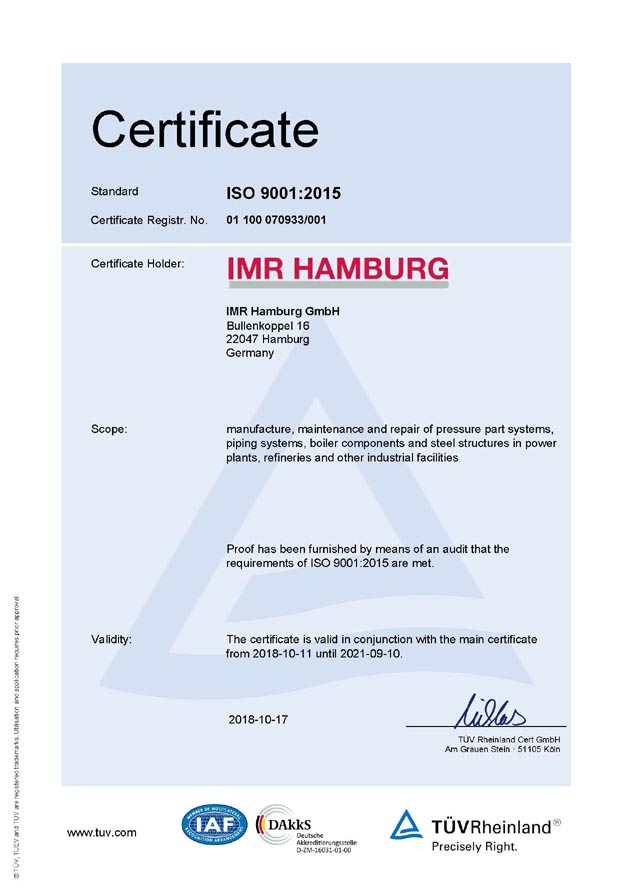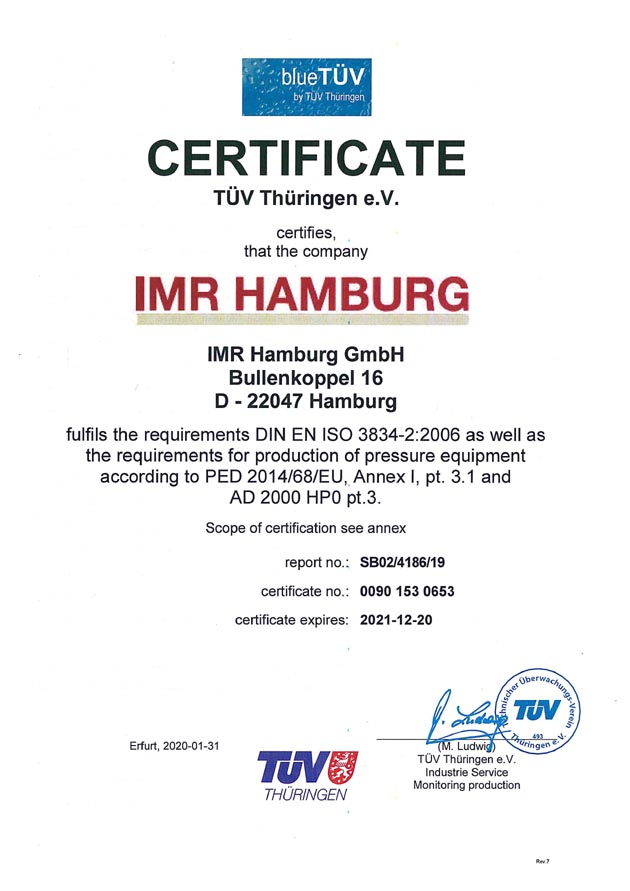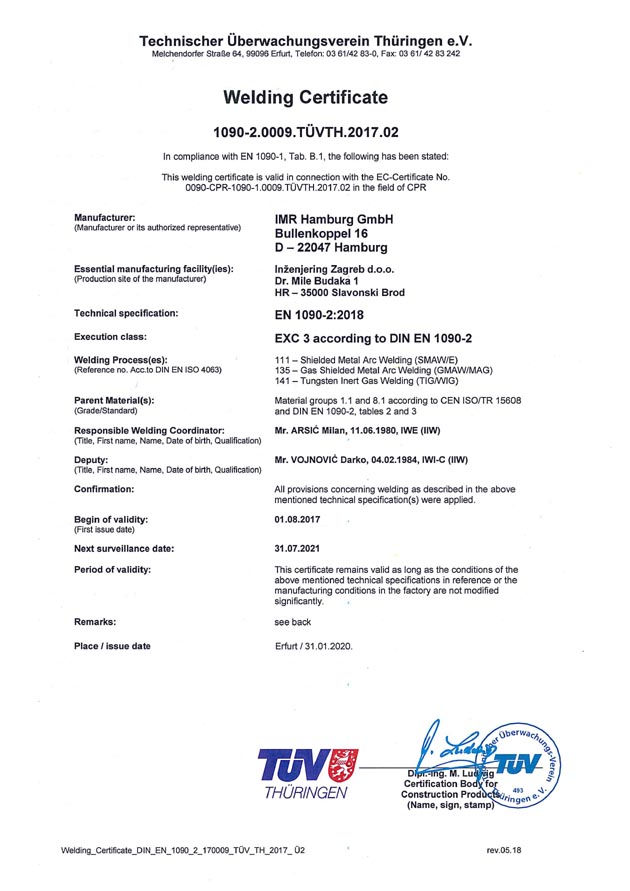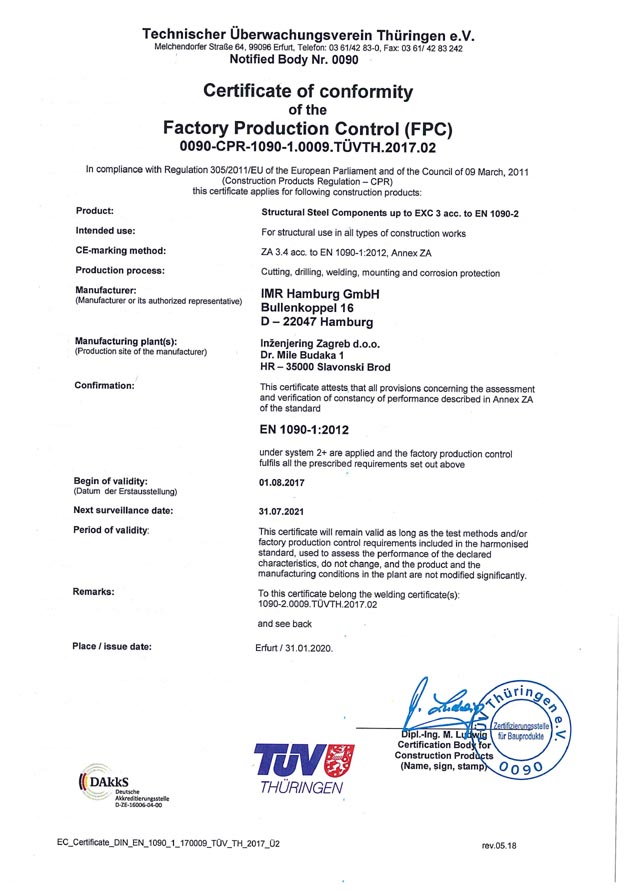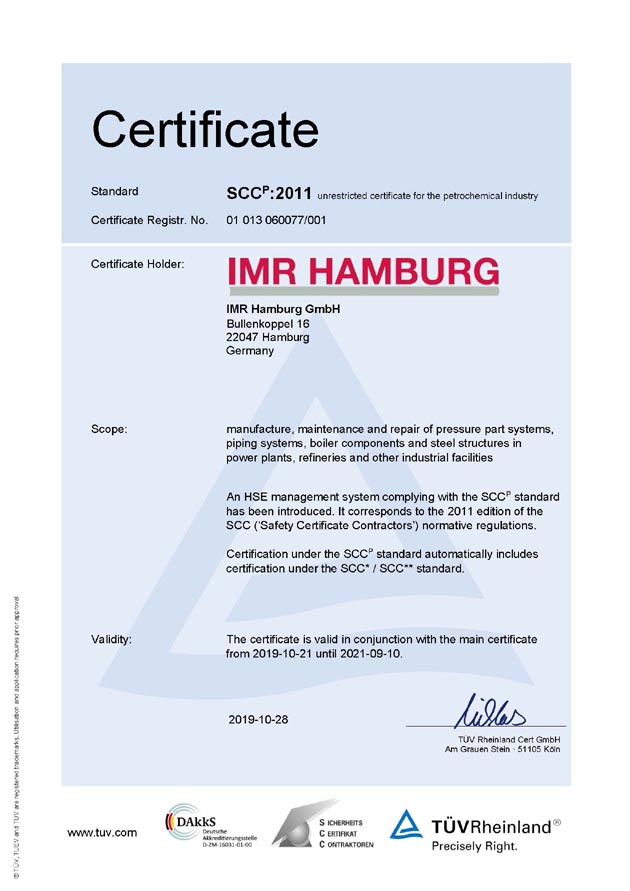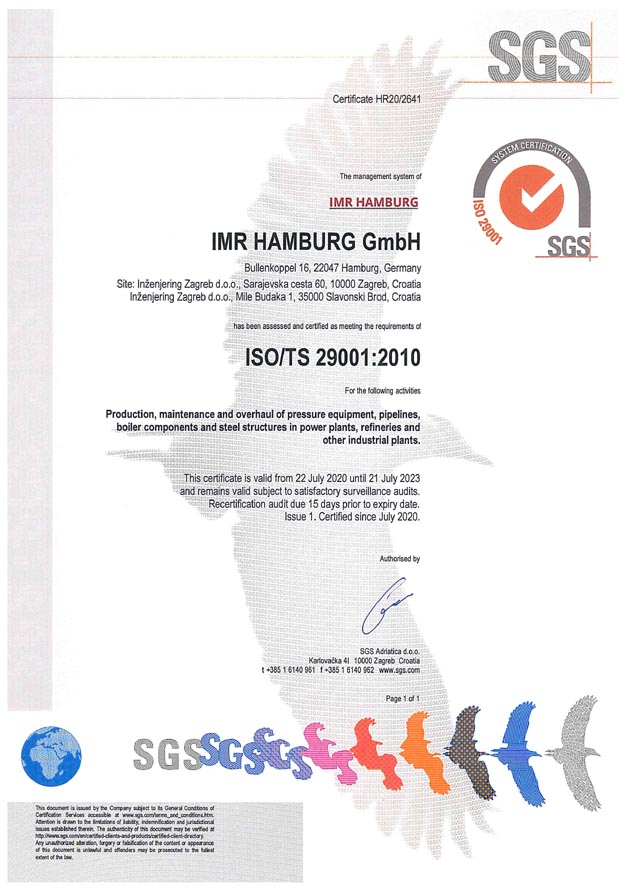Company
- Home
- »
- Company
Approvals
On this web site we listed for you some of our most important current certificates.
Performance spectrum
Our performance spectrum includes consultation, planning, construction, calculation, delivery and assembly, commissioning and documentation included, as well as revisions including quality assurance and project management for:
- High pressure, medium and low pressure systems and subsystems
- Cool water systems
- Heat extraction for power plants and thermal power stations
- Complete systems for heat supply
- Plant technology equipment for power stations and industrial plants
About us
We are a company that specializes in the pipelines for power stations and industrial facilities in Germany and Europe.
Quality is the foundation of our enterprise. With that quality we want to grow. Our objective is to attain high quality and reproducible achievements and respectively to produce products and establish standards that will guarantee an everywhere accepted quality. Among our customers are famous business groups in the chemical and petrochemical industry as well as food and utilities companies. Our goal is to construct an extensive service network for our growing circle of customers. The service should be offered in the long term to our customers, starting with the planning and the supply of materials and with rational as well as economical production included, so that the assembly procedure can take into consideration handling and coordination of all ancillary works in order to finish them professionally, properly and on schedule.
We have become particularly well known in the high pressure area jobs processing all kind of materials from high-alloyed “P92” 1.4901 to the plastics. Planning of IP and LP piping are CAD/CAE backed. We can process pipelines in all shapes and sizes. Pipe cutting, bevelling and assembling are always supervised from internal quality management. Documentation and Pressure Testing is implemented of course. We supply Project Detail Engineering and Material Management for LP, IP and HP piping, fittings, flanges, bar and valves.
For all materials the WPQR (welding procedure qualification records) and comprehensive experience are existant for the typical power plant, boiler and pressure vessel, process, pharma, shipping and offshore industry piping material:
- S235JR/St37-2 (DIN material no 1.0037, ASTM A29…A853)
- S355 (DIN material no 1.0045, ASTM A572 50)
- P235GH (pipe DIN material no 1.0345, ASTM A53 A)
- P250GH/C22.8 (flanges DIN material no1.0460, ASTM A105 down to -10°C)
- P265GH (pipe DIN material no 1.0425, ASTM A53 B and/or A106 B)
- P275NL1 (pipe DIN material no 1.0488, ASTM A350 LF1 and/or A662 A)
- 16Mo3 (pipe DIN material no 1.5415, ASTM A335 P1/P11)
- 13CrMo4-5 (pipe DIN material no 1.7335, ASTM A335 P12)
- 10CrMo9-10 (pipe DIN material no 1.7380, ASTM A335 P9/P22)
- “P91” (X10CrMoVNb9-1) (pipe DIN material no 1.4903, ASTM A335 P91)
- “P92” (X10CrWMoVNb9-2) (pipe DIN material no 1.4901, ASTM A335 P92)
- X20CrMoV11-1 (pipe DIN material no 1.4922, ASTM A335 old)
- “Wb36” (15NiCuMoNb5-6-4 ) (pipe DIN material no 1.6368, ASTM A335 P9)
- “Duplex” (pipe DIN material no 1.4462, ASTM A789,790 S32205)
- “V2A” X5CrNi18-10 (pipe DIN material no 1.4301, ASTM A312 304)
- “V4A” (X5CrNiMo17-12-2) (pipe DIN material no 1.4401 , ASTM A312 316)
- X6CriNiTi18-10 (pipe DIN material no 1.4541, ASTM A312 321)
- X6CrNiMo17-12-2 (pipe DIN material no 1.4571, ASTM A316Ti)
We are happy to make ourselves available to our customers for joint processing of tender documents and we look forward to create together a schedule and a cost approach to our mutual benefit. Security for the customer is provided by quality assurance: Our Quality Assurance Department staff is responsible for corporate approvals of IMR HAMBURG GmbH. These on the one hand make it legitimate for our company to accept high quality assignments and on the other hand are a guarantee to our clients that those assignments are conducted in accordance with current general and specific technical regulations and customer product specifications. In the transactions carried out by IMR Hamburg GmbH, a variety of materials and processes are taken into account according to customer requirements as well as all sorts of joining techniques (welding, gluing, pressing in) and constructional requirements. Another major activity of the IMR HAMBURG GmbH is the maintenance.
Numerous well known companies are using our significant experience. Repairs, inspections and maintenance will be performed during operations with compliance to different respective work norms and safety regulations of our customers. Various facilities, starting with petrochemical industry, food industry, hydropower and other power plants, will all be repaired by our staff. Those operations will include maintenance and repair works on boilers, tanks, heat exchangers, turbines, pumps and other plant components and aggregates as well as the repair of low and high pressure pipelines.
IMR GmbH Policy on Modern Slavery, Child Labour and Human Trafficking
1. Policy Statement
IMR GmbH has a zero-tolerance policy towards all forms of modern slavery, child labour, and human trafficking in its business operations and global supply chains.
We are committed to ethical conduct, human rights protection, and sustainable practices. Our actions are guided by the European Union Charter of Fundamental Rights, the German Supply Chain Due Diligence Act (LkSG), the ILO Core Conventions, and the UN Guiding Principles on Business and Human Rights.
IMR GmbH opposes and prohibits the use of:
– Forced or compulsory labour
– Child labour (as defined by ILO Conventions 138 & 182)
– Debt bondage
– Trafficking of persons, including recruitment through coercion, deception, or abuse of power
These standards apply to all IMR GmbH operations and to all employees, contractors, suppliers, and partners who work with or on behalf of the company, regardless of location.
2. Scope and Responsibilities
The Management Board of IMR GmbH holds ultimate responsibility for policy compliance and oversees its enforcement.
A designated Human Rights & Compliance Officer is responsible for:
– Policy implementation
– Monitoring risks and due diligence processes
– Coordinating audits and investigations
– Maintaining documentation required under the LkSG and EU Directive on Corporate Sustainability Due Diligence
All line managers are expected to promote awareness and enforce compliance within their teams.
3. Legal Framework and Compliance
This policy is designed to ensure compliance with the following laws and frameworks:
– German Supply Chain Due Diligence Act (LkSG)
– EU Directive on Corporate Sustainability Due Diligence (CSDDD)
– ILO Conventions 29, 105, 138, and 182
– UN Universal Declaration of Human Rights
– European Convention on Human Rights
Employees and third parties are required to report any suspicions or confirmed breaches of this policy without delay, via internal reporting channels or an anonymous whistleblowing mechanism.
4. Risk Assessment and Due Diligence
IMR GmbH conducts regular risk assessments of its supply chains to identify and mitigate risks related to child labour and forced labour.
All high-risk suppliers are subject to enhanced due diligence, including:
– Supplier self-assessments
– Site audits
– Contractual obligations on labour standards
– Corrective action plans where necessary
Suppliers and business partners must confirm compliance with IMR GmbH’s Code of Conduct and this policy as part of onboarding and ongoing evaluation.
5. Training and Awareness
IMR GmbH provides mandatory training on human rights, ethical sourcing, and modern slavery risks to employees involved in procurement, HR, legal, and compliance functions.
We actively communicate our expectations on labour practices to all suppliers and partners.
6. Reporting and Protection
IMR GmbH maintains a confidential whistleblowing mechanism to report human rights concerns, accessible to employees, suppliers, and third parties.
We will protect individuals who report concerns in good faith, in line with the EU Whistleblower Protection Directive.
7. Breaches and Enforcement
Breaches of this policy by employees may result in disciplinary action, including termination of employment.
IMR GmbH reserves the right to suspend or terminate business relationships with suppliers or partners who violate this policy or fail to implement adequate preventive measures.
Approval
Approved by the Management Board of IMR GmbH
Effective Date: 15.1.2020
Review Date: 15.1.2023
The German Whistleblower Protection Act – HinSchG: What Violations Can Whistleblowers Report?
Under the EU directive provision, Germany must implement the National Protection Act that ensures legal protection for people reporting violations in the following areas:
- Public procurement;
- Financial services, products, markets, prevention of money laundering and terrorist financing;
- Product safety and compliance;
- Transport safety;
- Protection of the environment;
- Radiation protection and nuclear safety;
- Food and feed safety, animal health, and welfare;
- Public health;
- Consumer protection;
- Protection of privacy and personal data, security of network and information systems.
Besides the minimum of areas recommended by the Directive, the German National Whistleblowing Protection Act goes further and also includes:
- Any penal provision under German law;
- Breaches of the regulations that protect life, health, and the rights of employees or their representative bodies. The most common cases for this will be regulations in the areas of occupational health and safety, violations of the minimum wage law, etc.;
- Statements by civil servants that represent a violation of their constitutional obligations to remain loyal to the oaths made to the Constitution;
- Both illegal and lawful actions or omissions, if they contradict the aim of the regulations in the areas of law;
- All violations of federal and state legal regulations and directly applicable EU legal acts.
What does the German Whistleblower Protection Act (HinSchG) include?
- Specifies whom it applies for
All German companies and organizations with 50 or more employees are required to establish a whistleblowing channel. For companies with 50 to 249 employees, there is a transition period until the 17th of December 2023; larger companies, with 250+ employees, must establish a suitable whistleblower channel by the 2nd of July 2023.
- Whistleblowing channels
Employees must be given the opportunity to file a report both verbally and in writing. Companies can also offer an indirect whistleblowing option via an ombudsman. Anonymous reporting is not a must, yet the law recommends that anonymous reports be received and processed.
- Internal Reporting
According to the HinSchG, companies must establish an internal reporting system by the 2nd of July 2023, through which employees and potentially third parties can report in writing, verbally or in person. Including:
- Written reports can be submitted through a digital whistleblowing system, a dedicated email address, a complaint mailbox, or by post;
- Verbal reports can be submitted through a form available within a digital whistleblowing system, whistleblowing hotline (phone), or answering machine system;
- In-person meetings should always be available either with a case handler as a follow-up or via an externally hired lawyer or ombudsmen.
There are no restrictions on using external reporting as a first choice. However, German law mentions that internal reporting should be a priority. Therefore, all companies should incentivize employees to use internal reporting in the first place.
HinSchG-E sets the minimum requirement for obligatory access to the internal reporting tool: it must be available for the company’s own employees and temporary workers. As for job applicants, partners, and other third parties, it is up to companies to define whether they could use their internal system.
- External reporting
Additionally, the Law mentions the obligatory establishment of an external reporting channel, which will be the responsibility of the Federal Office of Justice (BfJ). The main area of responsibility for external reporting within the Federal Office of Justice will be federal and state governments and information from the private and public sectors. Alongside this, the federal states can choose to set up their own offices for external reporting.
- Confidentiality of whistleblowers
The Whistleblower Protection Act prescribes all reporting channels to ensure the confidentiality of whistleblowers. Confidentiality is not the same as anonymity; a case handler can know a whistleblower’s identity. However, confidentiality implies that only a preapproved amount of people or one person, preliminary appointed by the company to review internal reports, knows a whistleblower’s identity and is responsible for maintaining complete confidentiality. Unless whistleblowers express consent or it is a case of a criminal proceeding, their personal information won’t be shared with any other 3rd-parties.
- Anonymous reports must be reviewed
Companies are not required to establish a reporting channel that allows employees to submit a report anonymously. Nevertheless, the law recommends that anonymous reports be accepted and processed.
- Follow-up responsibility within the company
The law also establishes deadlines for actions, such as when a whistleblower receives a confirmation of a submitted report and when is the latest to notify about the results. Whistleblowers must receive confirmation of the submitted report no later than 7 days after, and the update on the outcomes should follow no later than 3 months after.
Companies need to ensure that their feedback contains practical follow-up actions and a responsible person or office that can take it over. Examples of the follow-up action plan can be an initiation of internal investigations, a plan of action aimed at resolving a problem, a reference to procedures, a referral to a competent authority, or a comprehensive explanation in case of completion of proceedings due to lack of evidence or other reasons.
- Requirements for the investigation team
Companies need to appoint an internal case handler or an investigation team of several people (in the case of bigger companies) who will be responsible for receiving, investigating, and following up on submitted reports.
The people appointed to the investigation committee can be a compliance manager, legal counsel, data protection officer, finance or HR director, or similar, as long as these people can act independently and have the necessary specialist knowledge. Companies should organize regular training to ensure that case handlers know their responsibilities. Being a whistleblowing case handler is not a full-time job. These people can combine whistleblowing investigation duties with other tasks they were initially hired for.
As an alternative, companies can outsource the receipt and processing of information to external lawyers or ombudspersons, provided they offer appropriate guarantees for maintaining confidentiality and data protection.
- Shared systems and outsourcing
The law draft stipulates that organizations with a headcount of 50 – 249 employees are allowed to share whistleblower systems. Further, companies with multiple subsidiaries can share one system. It is possible via a third-party implementation. By being commissioned with the task of an internal registration office, a company can set up an independent and confidential body as a “third party” for its group companies to use the same system. The responsibility for investigating violations remains with the commissioning company.
- Additional provision – beyond EU requirements
German National Law extends beyond the set of requirements set by the EU Directive by including more cases.
Mainly, German lawmakers aim to broaden the scope of their draft law to protect whistleblowers from possible legal discrepancies and ensure that a comprehensive policy covers all reports. This expansion seeks to eliminate any confusion or doubts when it comes to those with critical information about wrongdoing, ensuring they feel safe disclosing what needs to be heard without risking repercussions later on.
Read the whole text of the draft law.
IMR Code of Conduct
Preamble
IMR Hamburg sees itself as part of an internationally interconnected economy and, as a company, is part of the states and societies in which it operates. IMR Hamburg adheres to the principles of the “honourable merchant” and acknowledges its responsibility as a company.
IMR Hamburg observes the direct and indirect impacts of its business activities on the environment and society and strives to balance economic, ecological, and social interests appropriately.
IMR Hamburg acts in accordance with generally accepted values and principles, complies with legal requirements, and particularly respects internationally recognized human rights and labour standards as outlined below.
IMR Hamburg supports the goals and content of this Code of Conduct and will, within its legal and actual capabilities, make all suitable and reasonable efforts to continuously adhere to this voluntary commitment at all its business locations, both domestically and abroad.
If existing national regulations conflict with the contents of this Code of Conduct or if the domestic context makes full compliance impossible, IMR Hamburg will seek ways to uphold the requirements of the Code of Conduct as much as possible.
Ethical / Moral Commitment and Integrity
IMR Hamburg pursues only legal business objectives and practices and maintains business relationships solely with reputable partners. The company treats business partners and customers fairly and respectfully. IMR Hamburg respects different legal, economic, social, and cultural backgrounds and the specific circumstances of the countries and regions in which it operates, complying with the laws and regulations of those areas. The company’s entrepreneurial actions are always guided by universal ethical values and principles, including integrity and respect for human dignity. IMR Hamburg supports free and fair global trade.
Corruption, Trade Control, Money Laundering
IMR Hamburg rejects all forms of bribery and corruption. The company avoids any appearance of such practices, including offering or accepting improper advantages. IMR Hamburg operates in compliance with applicable import and export control regulations and adheres to legal requirements for the prevention of money laundering.
Fair Competition
IMR Hamburg advocates for free and fair competition. The company does not tolerate anti-competitive agreements and ensures compliance with applicable antitrust laws. IMR Hamburg rejects competitive advantages gained through unfair business practices.
Handling of Personal Data, Protection of Confidential Information and Intellectual Property
IMR Hamburg respects the personal rights of its employees, business partners, and customers, complying with applicable legal and regulatory requirements for handling personal data and information security. The company protects entrusted trade secrets and other confidential information from unauthorized acquisition, use, and disclosure, at least in accordance with relevant legal provisions for the protection of trade secrets. IMR Hamburg respects the intellectual property of its business partners, customers, and other third parties, ensuring adequate measures are taken to protect intellectual property rights during the exchange of know-how and technologies.
Protection of Consumer Interests
Where IMR Hamburg’s products and services affect consumer interests, appropriate measures are taken to ensure the safety and quality of those products or services. The company ensures that its products or services comply with relevant consumer protection laws. In its information and sales activities, IMR Hamburg considers consumer interests by applying legal requirements for fair business, marketing, advertising practices, and consumer education.
Ecological Responsibility and Commitment
The protection and preservation of natural resources concern and obligate us all. With this awareness, IMR Hamburg conducts its business activities with ecological responsibility and commits to the goal of a climate-neutral future.
Environmental and Climate Protection
IMR Hamburg fulfills its ecological responsibility by applying applicable legal requirements and recognized standards for environmental and climate protection. The company works to continuously reduce the negative environmental and climate impacts of its business activities.
IMR Hamburg applies applicable laws and takes appropriate measures aligned with legal and internationally recognized standards, covering topics such as:
Proper and responsible handling of hazardous substances, chemicals, and waste, including disposal
Measures to reduce or avoid waste
Minimizing emissions from operations (e.g., wastewater, exhaust air, noise, greenhouse gases)
Conserving natural resources through measures like saving water, chemicals, and other raw materials, and promoting the circular economy
Use of climate- and environmentally friendly technologies, processes, raw materials, and products
Measures to increase energy efficiency and the share of renewable energies in energy consumption at company locations
Animal and Species Protection
IMR Hamburg observes principles for the protection of animals and biodiversity, aligning its business practices accordingly. The keeping and use of animals must comply with applicable animal welfare laws and be species-appropriate. The Washington Convention on International Trade in Endangered Species serves as a guideline.
Human Rights and Labour Standards
Human dignity is inviolable. Therefore, IMR Hamburg respects internationally recognized human rights as outlined in the Universal Declaration of Human Rights by the United Nations. The company adheres to internationally recognized labour standards of the International Labour Organization (ILO), as detailed in this Code of Conduct. In all business activities, IMR Hamburg strives not to cause or contribute to human rights violations and expects the same from its business partners. Where necessary and possible, IMR Hamburg supports its suppliers in this regard.
Employment Relationships
IMR Hamburg treats its employees with respect. The company rejects any form of unlawful punishment, abuse, harassment, intimidation, or other degrading treatment of workers. IMR Hamburg applies applicable labour laws to all employment relationships and expects the same from its contractual partners. Employees must be provided with understandable information about essential working conditions at the start of employment, including their rights and obligations, working hours, remuneration, and payment and billing modalities. IMR Hamburg respects and protects the right of employees to terminate their employment relationship by observing the applicable notice period.
Rejection of Child Labour and Protection of Young Workers
IMR Hamburg does not tolerate child labour and observes the applicable legal minimum age for employment. In any case, the company does not employ individuals under the age at which compulsory education ends in the country of employment, and under no circumstances under 15 years of age. Internships are organized in accordance with legal requirements. IMR Hamburg expects its contractual partners to have appropriate means to verify age to prevent child labour. If child labour is identified, all necessary measures must be taken immediately to prioritize the child’s well-being, protection, and development. For individuals under 18 years of age, the rights of young workers must be respected; they may only be employed if it is ensured that working and employment conditions do not endanger their health, safety, morals, or development.
Rejection of Forced Labour
IMR Hamburg rejects forced or compulsory labour in any form. This includes any form of debt bondage, serfdom, slavery or practices similar to slavery, human trafficking, and extends to all forms of involuntary labour and services that are incompatible with internationally recognized labour and social standards.
Principles of Remuneration
IMR Hamburg applies legal or, where applicable, collectively agreed provisions for the remuneration of work. The company ensures that employee pay does not fall below the applicable legal, collectively agreed, or industry-standard minimum wage. In countries or regions without a legal or collectively agreed wage framework, IMR Hamburg ensures that the wages paid for regular full-time work are sufficient to meet employees’ basic needs. Unlawful wage deductions, including deductions as disciplinary measures, are not tolerated by IMR Hamburg.
Working Hours
IMR Hamburg applies legal or applicable collectively agreed provisions regarding working hours, including overtime, rest breaks, and vacation. The company ensures that the regular weekly working hours plus maximum allowable overtime are not exceeded and that working time regulations are observed.
Freedom of Association
IMR Hamburg respects employees’ rights to freedom of association and assembly, as well as the right to collective bargaining, insofar as this is legally permissible and possible in the respective country of employment. If this is not permissible, IMR Hamburg seeks appropriate compromises for its employees.
Diversity and Inclusion, Non-Discrimination
IMR Hamburg values the diversity of its employees and promotes a work environment that enables inclusion. The company is committed to equal opportunities and rejects any form of discrimination and unequal treatment based on national or ethnic origin, social background, health status, disability, sexual orientation, age, gender, political opinion, religion, or belief. IMR Hamburg upholds the principle of equal pay for male and female workers for work of equal value.
Health and Safety at Work
IMR Hamburg observes national and international occupational health and safety standards. The company ensures a safe and health-promoting work environment to prevent accidents, injuries, and work-related illnesses, thereby safeguarding the safety and health of its employees and third parties.

